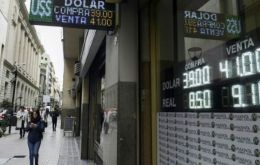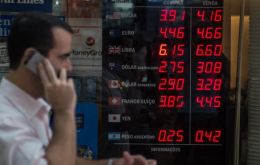MercoPress. South Atlantic News Agency
Tag: Exchange
-
Tuesday, April 9th 2019 - 09:59 UTC
Argentina's Peso takes a rest after a hectic week but the country risk shoots to its highest this year

Latin American stocks were flat on Monday, partly subdued by delays in important pension reform in Brazil, while currencies in the region rose against a weak dollar but Argentina's peso hovered around record-low levels on political uncertainty and the highest country risk so far this year.
-
Wednesday, March 27th 2019 - 20:54 UTC
Dollar rises in Uruguay while tension increases in Argentine markets

In Uruguay, the dollar traded at noon on the state bank Banco Republica (Brou) board at $ 33.20 for the purchase and $ 34.60 for the sale, 45 cents above the close price on Tuesday. On the board of private exchanges, the currency to the public came to sell at $ 34.80 and $ 34.90.
-
Friday, September 21st 2018 - 08:42 UTC
Brazil stocks lower but the Real currency recovered against the US dollar

Brazil stocks were lower after the close on Thursday, as losses in the real estate, industrial and financial sectors sectors led shares lower. At the close in Sao Paulo, the Bovespa index lost 0.01%.
-
Tuesday, September 11th 2018 - 09:12 UTC
Argentine equities and Peso lose ground on Monday: IMF and budget concerns

Argentine equities and the peso both lost ground on Monday as analysts said intervention in the foreign exchange market by the nation's central bank may prove less successful than originally hoped.
-
Wednesday, August 29th 2018 - 08:33 UTC
Brazilian currency down on presidential election forecast jitters

The Brazilian Real led losses in Latin America as lingering concerns over presidential elections overshadowed a largely positive environment for emerging market assets. The US dollar ended trading at 4.333 Reales.
